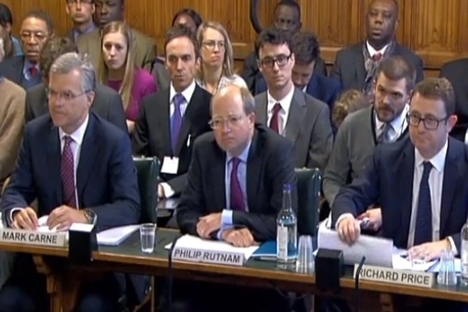20.11.15
ORR needs ‘fundamental review’ after CP5 failures, say MPs
MPs have called for a “fundamental review” of the Office of Rail and Road’s (ORR’s) ability to “robustly scrutinise” Network Rail’s plans and cost estimates, saying the regulator may not be fit for purpose.
Major enhancements may also need to be handled outside of the five-year control period model, according to the influential Public Accounts Committee (PAC), which says the DfT, Network Rail and ORR agreed to an “unrealistic” programme of rail investment for CP5 that contained “too much uncertainty” on the costs of many large projects when it was signed off.
Meg Hillier MP, chair of the PAC, said today: “Network Rail has lost its grip on managing large infrastructure projects.
“Our inquiry has found that the agreed work could never have been delivered within the agreed budget and timeframe. Yet Network Rail, the Department for Transport and the regulator – the Office of Rail and Road – signed up to the plans anyway.
“Passengers and the public are paying a heavy price and we must question whether the ORR is fit for purpose.”
The Committee’s latest report stated that in September 2014 the ORR decided that the ‘efficient cost’ for the Great Western electrification programme, should be £1.6bn. Since then the expected costs have increased by up to £1.2bn, as revealed by Mark Carne when giving evidence to the Committee.

Following the revelation, the regulator told the PAC it was not possible to tell what exactly the new cost range estimate, £2.5bn to £2.8bn, actually covered and should not be accepted until independently verified.
MPs said it is “not clear” whether the cost escalation is due to Network Rail inefficiency, ORR lacking a full understanding of the work needed, or a combination of both.
In light of the findings, PAC has recommended the DfT should carry out a fundamental review of the regulator’s role and effectiveness in rail infrastructure planning.
The MPs noted that the ORR told them that it could have ruled that Network Rail had breached its licence to operate the rail network at the start of CP5, after identifying planning and cost estimation risks associated with the enhancement programme. In spite of this, it did not take this step until October 2015, well after the risks had materialised.
A spokesperson for the Office of Rail and Road (ORR) said the regulator welcomed PAC’s scrutiny of Network Rail's investment programme for CP5, and that the escalating costs and late delivery of key rail projects are “unacceptable”.
“The report recognises that problems have arisen which need addressing for rail users and taxpayers and makes a series of recommendations which affect a number of parties,” he said. “We need to learn the lessons, and agree with PAC’s recommendations that uncertainties in key projects need to be addressed differently.
“With the changes to Network Rail’s ownership and finances since it became a public sector company, ORR agrees that a review of its own role in major projects is appropriate. That review will need to cover the specification, planning and costing of major projects, their delivery and monitoring. It is important that this review covers governance arrangements across all parties.”
As reported by RTM earlier this year, to date Network Rail has failed to deliver the target savings on renewals work. In fact, the infrastructure owner has spent £324m (12%) more on renewals during 2014-15 than the ORR signed off on, but has delivered “less than expected”.

For the next planning round of rail investment, and in all future investment planning, the government must assure itself that its plans can be delivered, stated the Committee. It has now called on the DfT and ORR to “assess and explain how uncertainty in key projects could affect the plan’s overall costs and schedule” for all rail spending decisions.
PAC added that the five-year rail investment planning and funding model, which is appropriate for ongoing operations, maintenance and renewals, is “not adequate” for major enhancement work such as the current electrification schemes.
In respect of this, the MPs want the ORR and DfT to put in place “sharper accountability arrangements” for major enhancement projects, such as the Great Western Main Line electrification, and agree principles on when it is appropriate to fund and manage these projects outside the five year rail funding cycle.
Network Rail has not escaped from the Committee’s glare, with the MPs calling for it to embed “much tighter” project planning, costing and cost control throughout the organisation. It must also be “clearer” with the DfT about what can and cannot be afforded.
Following the “unacceptable” cost increase on Great Western electrification, it has been recommended that the DfT and Network Rail publish an updated schedule and cost forecast for the project – along with a full account of what has caused the cost increases to date and proposals for controlling future costs.
PAC added that there is still “far too much uncertainty” on costs and eventual delivery dates for the other two major rail electrification programmes in the 2014-2019 programme: TransPennine and Midland Main Line, which have now been delayed into CP6.
Sir Peter Hendy’s review of these and the other rail enhancement planned for CP5, which is to be published towards the end of this year, will bring more bad news on costs, said the MPs.
Following the much-anticipated Hendy Review, the MPs want the DfT and Network Rail to publish a revised programme of rail electrification improvements, including the rationale for prioritisation between projects, with updated cost and delivery forecasts.
Network Rail and the DfT have also responded to the PAC’s report, here.